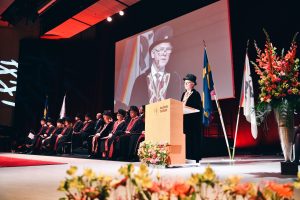Welcome, new KI professors!
Earlier today, I had the honour of congratulating Karolinska Institutet’s new professors in connection with the 2018 installation ceremony. Part of the text below is from my welcome speech, in which I emphasized that “you have reached the highest academic position at KI, and you have done so with a dedication to improve the health and well-being of humankind”.
For such is the dedication of the Karolinska Institutet. Our brand new vision statement reads as follows:
We – Karolinska Institutet – are advancing knowledge about life and strive towards better health for all
The first part of this vision statement – we are advancing knowledge about life – refers to the basic research that has brought Karolinska Institutet to world wide fame. The second part states in no uncertain terms that the overriding goal of all our activities – our research, education, innovation, and public outreach – is to promote health. We are dedicated to promote health for all – across geographical boundaries, and across generations. Indeed, embedded in this small word all lies a responsibility for the world at large and for generations not yet born. As a university we must work for an equitable and sustainable health care system, not only in the Stockholm region, not only in Sweden, but worldwide. I am confident that KI’s new professors share this view.
Many challenges
Challenges are many and profound. One example: about two-thirds of the world’s population – 5 billion people – have no access to safe, affordable surgical and anesthesia care when needed. We live in a world with stark inequality when it comes to health and health care. In my capacity as chair of the Lancet Commission on Global Governance for Health I have seen this inequality at close range. I have seen how inequalities are propagated and deepened by decisions in arenas outside of the health care system. But I have also seen how new ways of thinking and novel technological solutions can bring new hope to people in resource poor settings.
Challenges are complex. UN’s agenda 2030 with its Sustainable Development Goals highlights this complexity. Health is a factor in most of the 17 Sustainable Development Goals and is coupled to topics as diverse as climate, poverty, and institutional quality and integrity. This broad understanding of health must permeate our education as well as our research. This is exactly why we have chosen 2030 as the time horizon for our new strategy. Our Strategy 2030 will be inspired, challenged and energized by UN´s Agenda 2030.
Huge potential
KI has a huge potential to help tackle the challenges incorporated in the Sustainable Development Goals. Our new infrastructure and new buildings provide an excellent platform for basic, translational, and clinical research. When it comes to public health KI was ranked as number 5 in the world by the most recent Academic Ranking of World Universities.
KI’s new professors are entering a university in transformation. We are developing a new strategy plan, and we are creating a new organizational structure that will be operative as of January next year. And in the course of 2018, 60 percent of Karolinska Institutet’s personnel and approximately 80 percent of our experimental research will have moved into new buildings – Alfred Nobels Allé 8 (ANA 8) and NEO in Flemingsberg, as well as Bioclinicum, Biomedicum and Comparative Medicine in Solna. In addition to being a world-class research environment for the recruitment of excellent scientists, we provide venues for interaction between basic and clinical science and with the Karolinska University Hospital, Södersjukhuset and Danderyds Sjukhus. With new buildings and infrastructure, excellent biobanks and health registries, and through close cooperation with other universities and Stockholm County, I see few regions in the world that surpass ours when it comes to prospects of providing new breakthroughs in medicine and health sciences.
Role models
You, our new professors, are role models and as such you must strive to create a professional environment that invites contrasting ideas and opinions and accepts criticism where criticism is due. We must never lose our ethical compass and never, ever compromise on what is right and wrong. Medicine is, after all, first and foremost about human beings. You need to instill in our students the ability to see each patient as a whole person – a complex and unique individual with a wide set of skills and roles in life. You need to look for the synergies between research and teaching. These synergies are many and they are profound.



0 comments